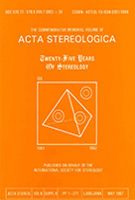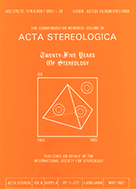- Home
- Volume 10 (1991)
- Number 1 - Stermat '90 (part I) - June 1991
- The stereology of the intergranular surface of a metal
View(s): 459 (1 ULiège)
Download(s): 89 (1 ULiège)
The stereology of the intergranular surface of a metal

Abstract
After some introductory remarks on the mathematical properties of a 4-connected, 3D honeycomb, two examples of this structure occurring in Nature --- the foam, and the polycrystal --- are compared and are seen in some respects to differ fundamentally. The stereology of the intergranular surface of a polycrystalline metal is then investigated experimentally, by determining topological characteristics of grains from a specimen of pure aluminium that have been separated from one another by the addition of gallium. It is found that, immediately after the aluminium has recrystallized, the faces assume a ‘non-random’ arrangement when the metal is annealed and grain growth takes place. The new arrangement is quantitatively described by a simple empirical equation.






